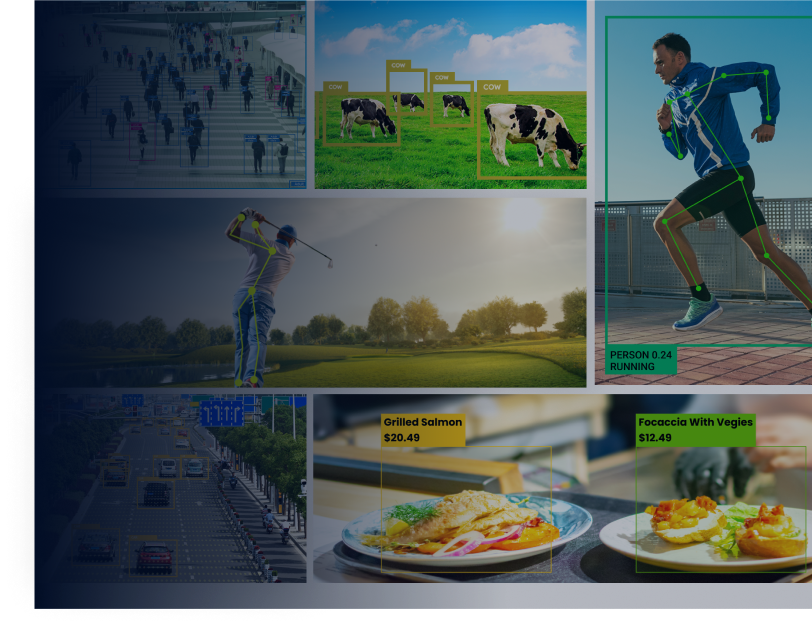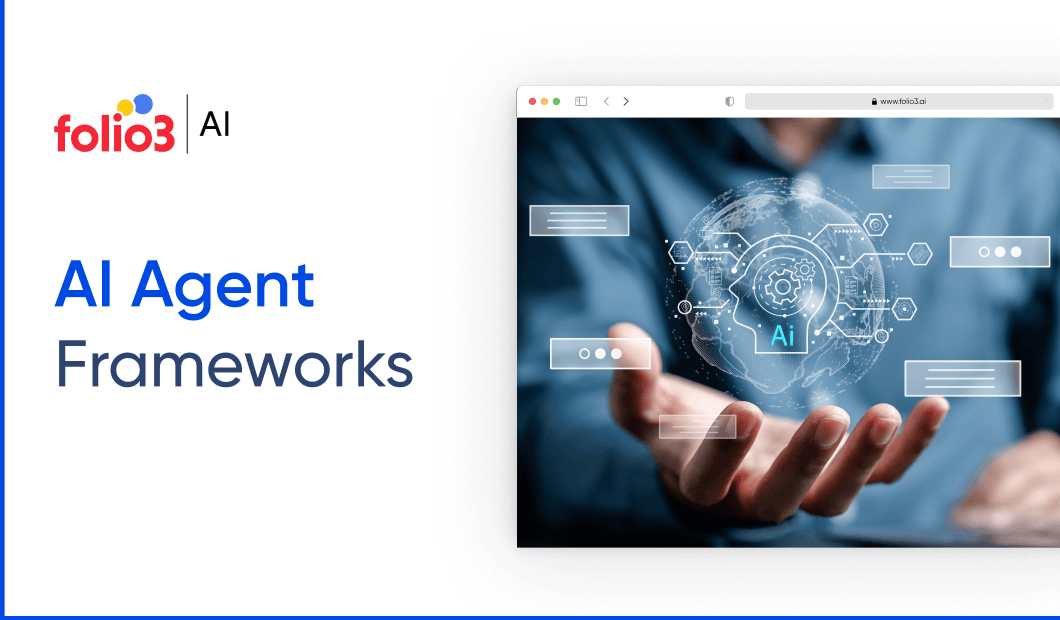AI agents are steadily shaping industries across the board. And, have a staggering impact on how businesses and entire systems operate. A clear reflection of this shift can be seen in Meta’s recent breakthrough, where the company introduced an AI model capable of autonomously evaluating and validating the output of other AI systems, signaling a decisive move towards self-governing AI ecosystems.
This kind of advancement is part of a larger trend, where AI agents are driving innovation by taking on increasingly complex tasks that demand not just perception, but also the ability to reason and make independent decisions. Enabling these agents to function at such a high level is the AI agent framework, which serves as the foundation for their intelligence.
Through this framework, agents can interpret the world around them, continuously learn from large and evolving data sets, and take purposeful, goal-oriented actions that enhance their performance and impact.
To delve deeper into how these frameworks function and why they are vital for the future of AI-driven industries, continue reading our full blog.
What Are AI Agent Frameworks?
Yes, we’ve all heard about AI agents, but what exactly is an AI agent framework? They are software platforms that help developers build intelligent agents more easily. These agents are programs that can understand their surroundings, make decisions, and complete tasks on their own.
Instead of creating everything from scratch, developers use these frameworks because they provide ready-made tools and features.
These tools often include ways for agents to make decisions, communicate with other systems, and manage tasks smoothly. By using AI agent frameworks, developers can save time, create more reliable systems, and handle larger or more complex projects.
Best AI Agent Frameworks of 2025
Your business demands the best AI agent framework to accelerate your project. It should support LLM integration, advanced reasoning, long-term memory, flexible tool coordination, and smooth collaboration between multiple agents.
Here we discuss some AI agent frameworks that empower you to achieve unmatched levels of automation and intelligence.
1- Open-Source AI Agent Frameworks
The open-source ecosystem has been instrumental in democratizing AI agent development. It offers powerful frameworks that allow organizations and individuals to build sophisticated AI systems without licensing barriers. Which are
LangChain
LangChain is an exemplary open-source framework designed to empower developers to build applications using large language models (LLMs) with ease and versatility. It facilitates no interruption integration between LLMs and external data sources, APIs, and computational tools.
What makes it best is its ability to handle inscrutable, multi-step reasoning and dynamic agent interaction, making it ideal for developing sophisticated AI-driven application
LangChain also enables the creation of highly contextualized and interactive AI systems. The framework is particularly well-suited for building applications such as AI-powered chatbots, automated data analysis pipelines, and custom knowledge assistants. LangChain’s modular approach allows for easy orchestration of multi-step reasoning processes, positioning it as a key player in the ecosystem of agent-driven AI applications.
Auto-GPT
Auto-GPT is an experimental open-source project that exemplifies the capabilities of autonomous AI agents. Built on top of OpenAI’s GPT-4 model, Auto-GPT distinguishes itself by generating its own prompts and breaking down objectives into a series of sub-tasks, creating a continuous feedback loop with minimal human input.
Its qualities of autonomously iterating and refining its output allow Auto-GPT to tackle complex goals such as business strategy development, content generation, and market research. By showcasing the potential of self-directed AI agents, Auto-GPT represents a significant leap toward achieving higher levels of general-purpose autonomy.
BabyAGI
BabyAGI is a standout open-source initiative developed to autonomously handle and execute task-based workflows. It employs reinforcement learning and natural language processing techniques, to dynamically generate new tasks, prioritize them based on changing objectives, and optimize its approach through continuous learning.
The system is engineered to break down high-level goals into granular, actionable items while adapting to evolving conditions in real-time. Its strength lies in its ability to operate as a lightweight, iterative task manager, making it particularly valuable for automating repetitive or multi-step workflows in various domains.
CrewAI
CrewAI introduces a collaborative dimension to AI agent frameworks by orchestrating teams of specialized agents to work together on complex projects. Rather than relying on a single agent to complete a task, CrewAI enables multiple agents to operate synergistically, each contributing their unique skillsets toward solving multifaceted problems.
This distributed and cooperative model is ideal for large-scale operations where tasks benefit from parallelization and diverse agent roles. It offers efficiency, flexibility, and adaptability to AI-driven solutions by replicating real-world team dynamics.
OpenAI’s Auto Agents
OpenAI’s Auto Agents extend the boundaries of autonomous AI by enabling businesses to create custom agents capable of completing high-level tasks independently. These agents can interpret broad objectives, formulate strategies, and execute them without constant human oversight.
Using, OpenAI’s powerful models, Auto Agents are designed to accelerate workflows in areas such as customer support, research automation, and business intelligence.
OpenAI’s emphasis on agent autonomy reflects a broader trend toward reducing human dependency in day-to-day digital operations, allowing organizations to reallocate resources towards strategic and creative efforts.
2- Enterprise and Commercial AI Agent Frameworks
While open-source frameworks promote experimentation and flexibility, commercial AI agent frameworks from leading tech giants are engineered for enterprise-grade scalability, security, and integration with existing business ecosystems.
Microsoft Autonomous Agents
Microsoft has integrated independent agents into its business ecosystem through services like Copilot Studio. These AI agents are purpose-built to automate and refine core business processes, such as IT operations, HR onboarding, and customer relationship management.
By using Microsoft’s cloud services, machine learning models, and productivity tools, these agents help organizations achieve greater efficiency, reduce operational costs, and get new insights from data.
Microsoft’s autonomous agents are designed with enterprise security and compliance in mind, making them an attractive option for large-scale business environments.
Google Gemini Agents
Google’s Gemini Agents, built upon the Gemini AI model, are designed to provide intelligent, context-aware assistance across Google’s cloud and productivity platforms. These agents can interpret complex queries, synthesize information across documents and data sources, and automate tasks such as scheduling, report generation, and decision support.
The Gemini framework emphasizes contextual understanding and seamless integration with Google Workspace, making these agents highly effective in enhancing employee productivity and delivering better workflow efficiency. Google’s approach reflects its focus on embedding AI agents into day-to-day business operations for proactive problem-solving.
AWS AI Agents
Amazon Web Services (AWS) has developed AI agent frameworks tailored to the specific needs of cloud-based enterprises. These AI Agents use AWS’s robust infrastructure and AI services, to manage tasks like data engineering, predictive analytics, and customer service automation.
AWS AI agents are designed with a focus on elasticity and scalability, enabling businesses to handle varying workloads without compromising performance.
Furthermore, AWS offers customization options through services such as SageMaker and Bedrock, allowing organizations to deploy agents finely tuned to their industry and operational requirements.
How AI Agent Frameworks Work
Now that you understand how various AI agent frameworks contribute to the development of AI agents, we’ll dive into the details of how they actually work. A typical AI agent framework comprises several integral components that collectively enable agents to function autonomously.
- Perception Module: This component allows the agent to gather information from its environment through various sensors or data inputs. It processes raw data into a structured form that the agent can understand and employ.
- Processing Layer: After data is collected, it must be cleaned, processed, and structured to make sense of it. This is where data interpretation takes place. c
- Decision-Making Module: Based on the interpreted data, this module enables the agent to make informed decisions by evaluating possible actions and selecting the most appropriate one to achieve its goals.
- Learning Mechanism: Incorporating machine learning algorithms, this component allows the agent to learn from experience, adapt to new situations, and improve its performance over time.
- Action Module: Once a decision is made, this module executes the chosen action, which could involve physical movements, data manipulation, or communication with other agents or systems.
AI Agents Use Cases
AI agents are now everywhere, name any operation in industries and it is all managed by, Agents. It’s managing and even solving problems, that traditionally require human involvement. Let’s explore some of the most common and impactful use cases.
1. Customer Support Automation
One of the most widespread uses of AI agents is in customer service, where virtual agents or chatbots handle routine inquiries. These agents can answer frequently asked questions, process refunds, troubleshoot technical problems, and even escalate more complex issues to human agents.
By automating repetitive tasks, companies can reduce response times, improve customer satisfaction, and free up human staff to focus on higher-level concerns.
2. Personal Assistants
AI agents power many personal assistants like Siri, Google Assistant, and Alexa. These agents are capable of scheduling meetings, setting reminders, managing to-do lists, controlling smart home devices, and providing real-time information like weather updates or navigation.
They rely on natural language processing to interact conversationally with users while connecting to various services and platforms.
3. Autonomous Vehicles
In the automotive industry, AI agents play a crucial role in self-driving cars. These agents perceive their surroundings using sensors like LiDAR, cameras, and radar and then make split-second decisions to navigate safely.
AI agents in autonomous vehicles continuously process traffic data, detect obstacles, plan routes, and adjust driving behavior to adapt to real-world conditions without direct human intervention.
4. Supply Chain and Logistics
AI agents are increasingly used in supply chain management to optimize operations. For example, agents can automatically monitor inventory levels, predict demand using machine learning models, and reroute shipments in response to disruptions.
In warehouses, robotic agents assist in picking and packing items, reducing human error and improving efficiency.
5. Finance and Trading
In the financial sector, AI agents are employed for algorithmic trading, fraud detection, and customer advisory services. Trading bots analyze market trends and execute buy or sell orders at speeds and scales that human traders cannot match.
Meanwhile, fraud detection agents monitor transaction data to spot suspicious activities, protecting both businesses and consumers.
6. Healthcare Assistants
AI agents are making healthcare more accessible by assisting in patient monitoring, appointment scheduling, and even diagnosing symptoms through telemedicine platforms. Some agents are integrated into wearable devices to track vital signs, alert healthcare providers to abnormalities, and provide recommendations based on real-time data.
7. Research and Data Analysis
AI agents are also helping researchers by automating data collection, analysis, and reporting. For example, agents can mine scientific papers for insights, assist in generating hypotheses, or even simulate experiments. This allows researchers to focus more on interpretation and critical thinking while leaving repetitive tasks to the agent.
Conclusion
This blog really talks about AI agent frameworks in detail and even mentions use cases. It just emphasizes the global impact of AI agents. From customer service and personal assistants to autonomous vehicles and advanced research tools, these agents are proving to be versatile and valuable assets across sectors.
At the core of their success lies well-designed AI agent frameworks, which provide the structure needed for agents to perceive, learn, and act with increasing levels of autonomy.
A system built using open-source platforms or through enterprise solutions from tech giants like Microsoft, Google, and AWS, AI agents are reshaping how businesses operate and how users interact with technology.
The future of AI agents is not just about automation but about creating intelligent systems that can collaborate, adapt, and drive meaningful impact across industries.

Areeb is a versatile machine learning engineer with a focus on computer vision and auto-generative models. He excels in custom model training, crafting innovative solutions to meet specific client needs. Known for his technical brilliance and forward-thinking approach, Areeb constantly pushes the boundaries of AI by incorporating cutting-edge research into practical applications, making him a respected developer in folio3.









